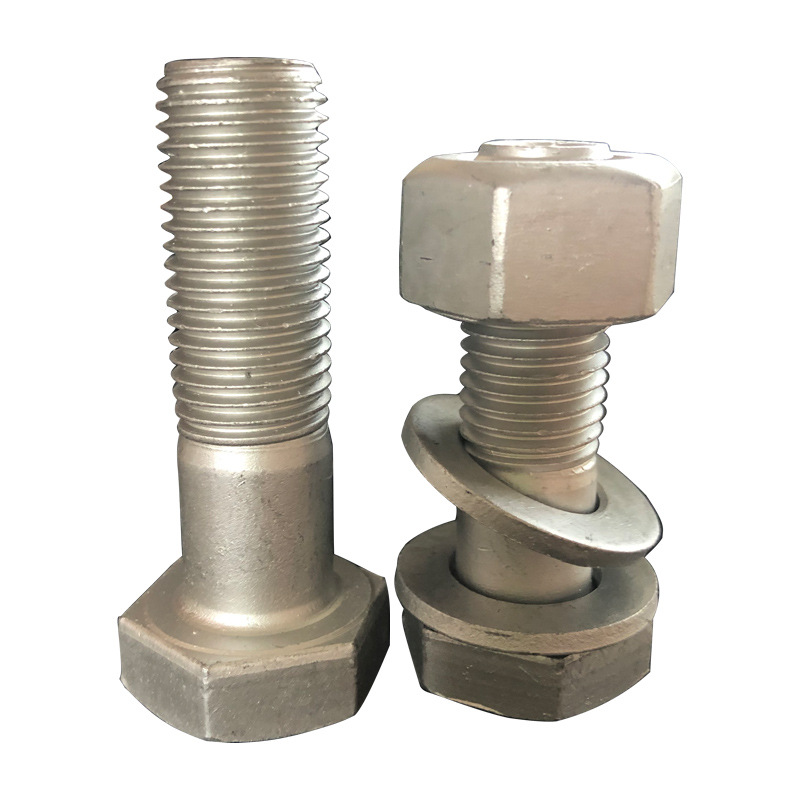The Difference Between Hexagonal Bolts of Different Materials
2025-06-23
Hexagonal bolts are commonly used fasteners in various industries, known for their simple, reliable design and their ability to provide a firm grip in mechanical applications. These bolts come in a wide range of materials, each suited for different environments and applications. The material chosen for a hexagonal bolt significantly influences its performance, durability, and cost-effectiveness. In this essay, we will explore the differences between hexagonal bolts made from various materials, focusing on their mechanical properties, corrosion resistance, and application suitability.
1. Steel Bolts
Steel is one of the most commonly used materials for manufacturing hexagonal bolts due to its strength, versatility, and affordability. Steel bolts are available in different grades, such as carbon steel, alloy steel, and stainless steel, each offering distinct advantages.
Carbon Steel Bolts: Carbon steel bolts are the most basic type and are known for their high tensile strength and hardness. These bolts are cost-effective, making them ideal for general-purpose applications in construction, automotive, and machinery. However, carbon steel is prone to rusting when exposed to moisture and harsh chemicals, so they may require a coating (like zinc plating) to improve corrosion resistance.
Alloy Steel Bolts: Alloy steel is stronger than carbon steel due to the addition of alloying elements such as chromium, nickel, and vanadium. These bolts are typically used in high-stress applications, such as heavy machinery or equipment requiring high durability and strength. The improved toughness of alloy steel makes it less likely to fracture under extreme conditions.
Stainless Steel Bolts: Stainless steel bolts are a top choice for environments where resistance to corrosion is critical, such as marine, food processing, and chemical industries. Stainless steel, particularly grades like AISI 304 and AISI 316, offers superior resistance to rust, oxidation, and staining. They are more expensive than carbon steel bolts, but the long-term benefits often outweigh the higher initial cost.
2. Aluminum Bolts
Aluminum bolts are known for their light weight and resistance to corrosion. They are commonly used in industries where weight reduction is essential, such as aerospace, automotive, and construction. Aluminum bolts are much lighter than steel bolts, making them ideal for applications where weight savings are a priority, such as in aircraft or bicycle frames.
However, while aluminum bolts are corrosion-resistant, they are not as strong as steel bolts, making them less suitable for high-load applications. Aluminum bolts are typically used for fastening lightweight components or for applications where strength is not as critical.

3. Titanium Bolts
Titanium bolts are known for their exceptional strength-to-weight ratio and high resistance to corrosion, even in harsh environments like seawater or extreme temperatures. Titanium is significantly stronger and lighter than steel, making it the material of choice for high-performance industries such as aerospace, military, and sports equipment.
While titanium bolts are more expensive than steel and aluminum bolts, their superior mechanical properties and longevity justify the cost for critical applications. Titanium bolts are highly resistant to corrosion and fatigue, which makes them ideal for environments where other materials might fail due to corrosion or stress.
4. Brass Bolts
Brass is an alloy of copper and zinc, and brass bolts are often used for applications requiring low friction, good electrical conductivity, and moderate strength. These bolts are commonly found in electrical and plumbing systems, as well as in decorative applications like furniture and fixtures.
Brass bolts are highly resistant to corrosion, particularly in water or damp environments, and do not rust like steel. However, brass is softer than steel or titanium and has a lower tensile strength, making it unsuitable for high-load or high-stress applications. Brass bolts are often used in low-torque applications where strength is not the primary concern.
5. Copper Bolts
Copper bolts are less commonly used but have unique properties that make them suitable for specific applications. Copper is highly resistant to corrosion, particularly in moist and acidic environments, making it ideal for use in marine, electrical, and chemical industries. Copper bolts also have excellent thermal and electrical conductivity, making them ideal for electrical connections.
However, copper is relatively soft compared to steel, which limits its use in high-stress applications. It is also more expensive than other materials, which can be a limiting factor for its widespread use.
6. Plastic Bolts
Plastic bolts, typically made from materials like nylon, polypropylene, or polycarbonate, are used in specialized applications where electrical insulation, light weight, or resistance to chemicals is required. They are commonly used in the electronics, automotive, and medical industries.
Plastic bolts are non-corrosive, lightweight, and easy to install, but they lack the mechanical strength of metal bolts and should only be used in applications with low stress or where a plastic bolt's insulating properties are required. Plastic bolts are also temperature-sensitive, and high heat may cause them to weaken or deform.
7. Conclusion
The material of a hexagonal bolt plays a critical role in determining its strength, corrosion resistance, and suitability for specific applications. Steel bolts are widely used for general-purpose applications, with different grades offering varying levels of strength and corrosion resistance. Aluminum and titanium bolts offer significant advantages in lightweight and high-performance applications, while brass, copper, and plastic bolts are preferred for specialized uses requiring corrosion resistance, electrical conductivity, or insulation. Choosing the right material for a hexagonal bolt depends on factors such as the load-bearing requirements, environmental conditions, and cost constraints. Each material has its advantages and limitations, making it essential to consider the specific demands of the application before selecting the appropriate bolt material.
As a professional manufacturer and supplier, we provide high-quality products. If you are interested in our products or have any questions, please feel free to contact us.